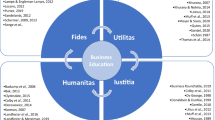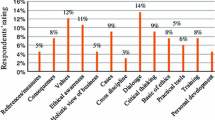Abstract
In this essay I show that business needs business school graduates who are capable of ethical business action. Thus, business ethics courses should help students develop the capacities and skills they will need to act ethically at work. Towards this developmental end, I list eight steps business ethicists can take to implement service learning in their courses. I show how service learning in the classroom can be combined with a college honorary program to promote ethical business actions in students.
Similar content being viewed by others
REFERENCES
Boss, J.: 1994, ‘The Effect of Community Service Work on the Moral Development of College Ethics Students’, Journal of Moral Education 23(2), 183-198.
Bowie, N. E. and R. F. Duska: 1990, Business Ethics, Second Edition, Prentice Hall, New Jersey, pp. 17-44.
Boyer, E. L.: 1990, Scholarship Reconsidered, Priorities of the Proffessoriate, Carnegie Foundation for the Advancement of Teaching, New Jersey, pp. 22.
Byrne, P. H.: 1995, ‘Paradigms of Justice and Love’, Conversations 7, 5-17.
Center for Education in Business Ethics and the American Philosophical Association: 1980, Report of the Committee for Education in Business Ethics, sponsored by a grant from the National Endowment for the Humanities, Newark, Delaware.
Cohen, J. and D. Kinsey: 1994, ‘“Doing Good” and Scholarship: A Service Learning Study’, Journalism Educator 48(4), 4-14.
Coleman, J. S.: 1977, ‘Differences Between Experiential and Classroom Learning’, in M. T. Keaton (ed.), Experiential Learning: Rational, Characteristics, and Assessment, Jossey-Bass, San Francisco, pp. 49-61.
Delve, C. I., S. D. Mintz and G. M. Stewart: 1990, ‘Promoting Values Development Through Community Service: A Design’, in C. I. Delve, S. D. Mintz and G. M. Stewart (ed.), Community Service as Values Education, Jessey-Bass, San Francisco, pp. 7-29.
Dewey, J.: 1916, Democracy and Education, The Free Press, New York.
Dewey, J.: 1993, How We Think, Heath, Boston.
Duska, R. F.: 1991, ‘What's the Point of a Business Ethics Course?’, Business Ethics Quarterly 1(4), 335-354.
Feldman, H. D. and R. C. Thompson: 1990, ‘Teaching Business Ethics: A Challenge for Business Educators in the 1990's’, Journal of Marketing Education (Summer) 10-22.
Freud, S.: 1917, A General Introduction to Psychoanalysis, Washington Square Press, New York.
Juersivich, H.: 1997, ‘Community Service Linked to Academics’, Creightonian (November 21) 77(10), 2.
Kohls, J.: 1996, ‘Student Experiences with Service Learning in a Business Ethics Course’, Journal of Business Ethics 15(1), 45-57.
Krathwohl, D. R., B. Bloom and B. Masia: 1964, Taxonomy of Educational Objectives: The Classification of Educational Goals, Handbook II: Affective Domain, David McKay Co., New York.
Markus, G., J. P. F. Howard and D. C. King: 1993, ‘Integrating Community Service and Classroom Instruction Enhances Learning: Results from an Experiment’, Educational Evaluation and Policy Analysis 15(4), 410-419.
Martin, M. W.: 1997, ‘Advocating Values: Professionalism in Teaching Ethics’, Teaching Philosophy 20, 19-34.
McDonald, G. M. and G. D. Donleavy: 1995, ‘Objections to the Teaching of Business Ethics’, Journal of Business Ethics 14, 839-853.
Pamental, G. L.: 1991, ‘The Course in Business Ethics: Why Don't Philosophers Give Business Students What They Need?’, Business Ethics Quarterly 1(4), 385-394.
Pincus, L.: 1996, Confidential Business Ethics Pedagogy Survey for the Times Mirror Higher Education Group, with permission from McGraw-Hill.
Plato: 1961/4th century BC, ‘Meno’, in E. Hamilton and H. Cairns (eds.), The Collected Dialogues of Plato, Princeton University Press, New Jersey, pp. 353-384.
Rest, J. R.: 1986, Moral Development, Advances in Research and Theory, Praeger, New York.
Rest, J. R. and D. Narvaez: 1994, Moral Development in the Professions, Psychology and Applied Ethics, Lawrence Erlbaum, New Jersey.
Service Learning Committee: 1997, Integrating Service and Learning at Creighton University: A Vision for the Future with Recommendations for Action, Creighton University, Omaha, Nebraska, May 10.
Shaw, W. H. and V. Barry: 1995, Moral Issues in Business 6th Edition, Wadsworth, California, pp. 199-257.
Singer, P.: 1995, ‘Rich and Poor’, in W. H. Shaw and V. Barry (eds.), Moral Issues in Business 6th Edition, Wadsworth Publishing Company, Belmont, California, pp. 132-139.
Social Service and Service Learning Symposium: 1997, Association for Moral Education Conference: Voices of Care and Justice, Atlanta, Georgia, November, 20-22.
Author information
Authors and Affiliations
Rights and permissions
About this article
Cite this article
Kracher, B. What Does it Mean when Mitchell Gets an ‘A’ in Business Ethics? or the Importance of Service Learning. Teaching Business Ethics 2, 291–303 (1998). https://doi.org/10.1023/A:1009741814158
Issue Date:
DOI: https://doi.org/10.1023/A:1009741814158




